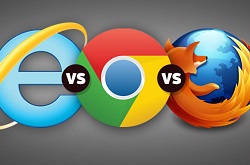
Your Web browser is probably the most-used application on your PC. You check your email in it, you write in it, you collaborate with coworkers in it, you use it to watch cat videos. With so much at stake, you need a browser that works well for you.
 When we looked at the browser contenders previously, we concluded that all the major browsers loaded webpages at similar speeds.
When we looked at the browser contenders previously, we concluded that all the major browsers loaded webpages at similar speeds.
But many new Web apps and services rely heavily on HTML5 and JavaScript, so the browser makers have been spending a lot of development time making sure that their programs render such apps and services quickly and efficiently.
To gauge how well browsers handle HTML5 and JavaScript code, we subjected Chrome, IE, and Firefox to the Sunspider JavaScript benchmark and to the WebVizBench benchmark for HTML5. In addition, we tested on a PC with switchable Nvidia graphics hardware to see how each browser exploited the extra processing horsepower in the graphics card.
Our test PC was an Acer Aspire Timeline Ultra M5 laptop with a 1.7GHz Intel Core i5 processor and 6GB of memory. The switchable graphics system consisted of an integrated Intel HD Graphics 4000 chipset and a dedicated Nvidia GeForce GT 640M graphics card with 1GB of video memory.
In our WebVizBench HTML5 benchmark test, Chrome and IE 9 saw large increases in performance when we switched to the dedicated graphics card instead of the integrated graphics chip.
Chrome achieved an average score of 5502 when we used the integrated graphics system, and hit an average of 5825 when we used the Nvidia graphics card. IE 9 came in second with average scores of 4797 and 5642, respectively; Firefox finished third after posting average scores of 4492 and 5600. Notably, Chrome did almost as well on this test using the integrated graphics hardware as the other browsers did using the more powerful Nvidia graphics card. So if your PC has a weak graphics card, you'll probably get better performance from Chrome than from Firefox or IE.
Our tests for JavaScript performance were less conclusive, with all three browsers rendering the benchmark’s JavaScript code within 15 milliseconds of one another. Internet Explorer 9 eked out a narrow victory, completing the Sunspider benchmark in 200 milliseconds. Chrome 21 finished in second place at 206 milliseconds, and Firefox 15 rounded out the three at 214 milliseconds.

 Previous page
Previous page Back to top
Back to top







